
COMMENTARY
Malcolm X’s message remains relevant
3/28/2013
Malcolm X
Thursday marks the 48th anniversary of Malcolm X’s assassination at the age of 39. In Toledo and around the country — including Detroit, the Nation of Islam’s birthplace and home to one of the first temples Malcolm attended — the date will be observed with little fanfare.
Even in Michigan, where “Detroit Red” spent much of his youth, no monuments, libraries, or public waysides celebrate this seminal freedom fighter.
Today, Malcolm X is often relegated to little more than a footnote in American history, despite the recent controversy and attention generated by Columbia University professor Manning Marable’s Pulitzer Prize-winning biography, Malcolm X: A Life of Reinvention.
As we observe another Black History Month, it’s time to restore Malcolm’s proper place in history. He remains, in my view, the greatest American leader of any color in the past century. His unflinching courage and conviction, open and evolving mind, and journey from street hustler and prisoner to international voice for the oppressed give him an unparalleled place in U.S. history.
Too often, we equate leadership with elected office. Malcolm X was not “political” in the corrupting, compromising, and ultimately cowardly way we’ve come to define the word.
He sought justice “by any means necessary,” and he wasn’t interested in turning the other cheek. Even critics of his fiery rhetoric, however, acknowledged that the fear and discomfort it engendered made it easier for others who professed nonviolence, including the Rev. Martin Luther King Jr., to push the nation forward.
A spellbinding orator, Malcolm took complex ideas and made them plain. During the tumultuous 1960s, his call for self-determination resounded in the nation’s burning ghettos.
Toward the end of his life, he carried the struggles of African Americans into the global arena, redefining the movement as one of human — not just civil — rights. He changed how the world viewed African Americans, and how African Americans viewed themselves. Malcolm wanted black people to love themselves as much as he loved them.
He was also a rare cat — someone who could fess up to mistakes, change his mind when he was presented with new information, and not dodge his blemishes and blunders. After a pilgrimage to Mecca in 1964, he altered his views on whites and race relations, affirming that we are all part of the human family. But he remained a black nationalist, understanding that African Americans must control their institutions and economies to gain real equality.
The nation has changed enormously since Malcolm X was assassinated by Nation of Islam gunmen in Manhattan’s Audubon Ballroom on Feb. 21, 1965. Even so, America’s great progress remains uneven, its promise of justice unfulfilled.
Concentrated poverty and gun violence are more insidious today than they were a half century ago. America’s first African-American president presides over a country with nearly 1 million black men locked up in its jails and prisons. The nation needs a new urban agenda that traditional civil rights groups must get squarely behind.
It’s a movement Malcolm X would have helped define. He spoke for the poor and disfranchised in America’s central cities, including those in Toledo.
A former prisoner who cleaned himself up, Malcolm spoke with authority about the criminal justice system. As someone who regularly speaks to prisoners, I know Malcolm X remains an icon and inspiration behind the walls.
He never sought national honors while he lived, nor would he expect them after his death. Still, acknowledging his life in a more concrete and enduring way could encourage others to carry on his work. That’s the best way to honor this fearless and uncompromising freedom fighter.
Nearly 50 years after his death, Malcolm X continues to remind us of not how far we’ve come, but how far we have yet to go.
Jeff Gerritt is deputy editorial page editor of The Blade.
Contact him at: jgerritt@theblade.com or 419-724-6467 Follow him on twitter@jeffgerritt.